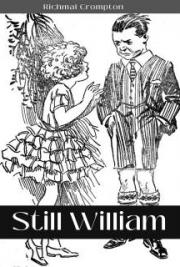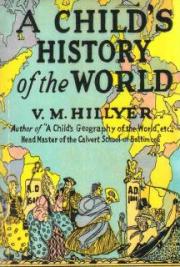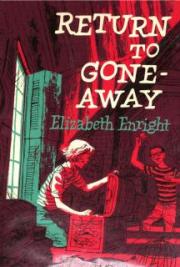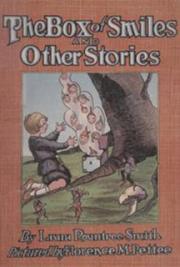XXXV
THE CRIMSON RAMBLER
While Mrs. Carey was talking with Mr. Lord, Nancy skimmed across the barn floor intent on some suddenly remembered duty, went out into the garden, and met face to face a strange young man standing by the rose trellis and looking in at the dance through the open door.
He had on a conventional black dinner-coat, something never seen in Beulah, and wore a soft travelling cap. At first Nancy thought he was a friend of the visiting fiddler, but a closer look at his merry dark eyes gave her the feeling that she had seen him before, or somebody very like him. He did not wait for her to speak, but taking off his cap, put out his hand and said: "By your resemblance to a photograph in my possession I think you are the girl who planted the crimson rambler."
"Are you 'my son Tom'?" asked Nancy, open astonishment in her tone. "I mean my Mr. Hamilton's son Tom?"
"I am my Mr. Hamilton's son Tom; or shall we say our Mr. Hamilton's?
Do two 'mys' make one 'our'?"
"Upon my word, wonders will never cease!" exclaimed Nancy. "The Admiral said you were in Boston, but he never told us you would visit Beulah so soon!"
"No, I wanted it to be a secret. I wanted to appear when the ball was at its height; the ghost of the old regime confronting the new, so to speak."
"Beulah will soon be a summer resort; everybody seems to be coming here."
"It's partly your fault, isn't it?"
"Why, pray?"
"'The Water Babies' is one of my favorite books, and I know all about Mother Carey's chickens. They go out over the seas and show good birds the way home."
"Are you a good bird?" asked Nancy saucily.
"I'm home, at all events!" said Tom with an emphasis that made Nancy shiver lest the young man had come to Beulah with a view of taking up his residence in the paternal mansion.
The two young people sat down on the piazza steps while the music of The Sultan's Polka floated out of the barn door. Old Mrs. Jenks was dancing with Peter, her eighty-year-old steps as fleet as his, her white side-curls bobbing to the tune. Her withered hands clasped his dimpled ones and the two seemed to be of the same age, for in the atmosphere of laughter and goodwill there would have been no place for the old in heart, and certainly Mrs. Jenks was as young as any one at the party.
"I can't help dreading you, nice and amiable as you look," said Nancy candidly to Tom Hamilton; "I am so afraid you'll fall in love with the Yellow House and want it back again. Are you engaged to be married to a little-footed China doll, or anything like that?" she asked with a teasing, upward look and a disarming smile that robbed the question of any rudeness.
"No, not engaged to anything or anybody, but I've a notion I shall be, soon, if all goes well! I'm getting along in years now!"
"I might have known it!" sighed Nancy. "It was a prophetic instinct, my calling you the Yellow Peril."
"It isn't a bit nice of you to dislike me before you know me; I didn't do that way with you!"
"What do you mean?"
"Why, in the first letter you ever wrote father you sent your love to any of his children that should happen to be of the right size. I chanced to be just the right size, so I accepted it, gratefully; I've got it here with me to-night; no, I left it in my other coat," he said merrily, making a fictitious search through his pockets.
Nancy laughed at his nonsense; she could not help it.
"Will you promise to get over your foolish and wicked prejudices if I on my part promise never to take the Yellow House away from you unless you wish?" continued Tom.
"Willingly," exclaimed Nancy joyously. "That's the safest promise I could make, for I would never give up living in it unless I had to. First it was father's choice, then it was mother's, now all of us seem to have built ourselves into it, as it were. I am almost afraid to care so much about anything, and I shall be so relieved if you do not turn out to be really a Yellow Peril after all!"
"You are much more of a Yellow Peril yourself!" said Tom, "with that dress and that ribbon in your hair! Will you dance the next dance with me, please?"
"It's The Tempest; do you know it?"
"No, but I'm not so old but I may learn. I'll form myself on that wonderful person who makes jokes about the Admiral and plays the fiddle."
"That's Ossian Popham, principal prop of the House of Carey!"
"Lucky dog! Have you got all the props you need?"
Nancy's hand was not old or strong or experienced enough to keep this strange young man in order, and just as she was meditating some blighting retort he went on:—
"Who is that altogether adorable, that unspeakably beautiful lady in black?—the one with the pearl comb that looks like a crown?"
"That's mother," said Nancy, glowing.
"I thought so. At least I didn't know any other way to account for her."
"Why does she have to be accounted for?" asked Nancy, a little bewildered.
"For the same reason that you do," said the audacious youth. "You explain your mother and your mother explains you, a little, at any rate. Where is the celebrated crimson rambler, please?"
"You are sitting on it," Nancy answered tranquilly.
Tom sprang away from the trellis, on which he had been half reclining. "Bless my soul!" he exclaimed. "Why didn't you tell me? I have a great affection for that rambler; it was your planting it that first made me—think favorably of you. Has it any roses on it? I can't see in this light."
"It is almost out of bloom; there may be a few at the top somewhere;
I'll look out my window to-morrow morning and see."
"At about what hour?"
"How should I know?" laughed Nancy.
"Oh! you're not to be depended on!" said Tom rebukingly. "Just give me your hand a moment; step on that lowest rung of the trellis, now one step higher, please; now stretch up your right hand and pick that little cluster, do you see it?—That's right; now down, be careful, there you are, thank you! A rose in the hand is worth two in the morning."
"Put it in your button hole," said Nancy. "It is the last; I gave your father one of the first a month ago."
"I shall put this in my pocket book and send it to my mother in a letter," Tom replied. ("And tell her it looks just like the girl who planted it," he thought; "sweet, fragrant, spicy, graceful, vigorous, full of color.")
"Now come in and meet mother," said Nancy. "The polka is over, and soon they will be 'forming on' for The Tempest."
Tom Hamilton's entrance and introduction proved so interesting that it delayed the dance for a few moments. Then Osh Popham and the master fiddler tuned their violins and Mrs. Carey assisted Susie Bennett at the piano, so that there were four musicians to give fresh stimulus to the impatient feet.
Tom Hamilton hardly knew whether he would rather dance with Nancy or stand at the open door and watch her as he had been doing earlier in the evening. He could not really see her now, although he was her partner, his mind was so occupied with the intricate figures, but he could feel her, in every fibre of his body, the touch of her light hand was so charged with magnetism.
Somebody swung the back doors of the barn wide open. The fields, lately mown, sloped gently up to a fringe of pines darkly green against the sky. The cool night air stirred the elms, and the brilliant moon appeared in the very centre of the doorway. The beauty of the whole scene went to Tom Hamilton's head a little, but he kept his thoughts steadily on the changes as Osh Popham called them.
To watch Nancy Carey dance The Tempest was a sight to stir the blood. The two head couples joined hands and came down the length of the barn four abreast; back they went in a whirl; then they balanced to the next couple, then came four hands round and ladies' chain, and presently they came down again flying, with another four behind them. The first four were Nancy and Tom, Ralph Thurston and Kathleen, the last two among the best dancers in Beulah; but while Kitty was slim and straight and graceful as a young fawn, Nancy swept down the middle of the barn floor like a flower borne by the breeze. She was Youth, Hope, Joy incarnate! She had washed the dishes that night, would wash them again in the morning, but what of that? What mattered it that the years just ahead (for aught she knew to the contrary) were full of self-denial and economy? Was she not seventeen? Anything was possible at seventeen! What if the world was to be a work-a-day world? There was music and laughter in it as well as work, and there was love in it, too, oceans of love, so why not trip and be merry and guide one's young partner safely through the difficult mazes of the dance and bring him out flushed and triumphant, to receive mother's laughing compliments?
Everybody was dancing The Tempest in his or her own fashion, thought the Admiral, looking on. Mrs. Popham was grave, even gloomy from the waist up, but incredibly lively from the waist down, moving with the precision of machinery, while her partner, a bricklayer from Beulah Centre, engaged the attention of the entire company by his wonderful steps. She was fully up to time too, you may be sure, as her rival, Mrs. Bill Harmon, was opposite her in the set. Lallie Joy, clad in one of Kathleen's dresses, her hair dressed by Julia, was a daily attendant at the Vacation School, but five weeks of steady instruction had not sufficed to make her sure of ladies' grand chain. Olive moved like a shy little wild thing, with a bending head and a grace all her own, while Gilbert had great ease and distinction.
There was a brief interval for ice cream, accompanied by marble cake, gold cake, silver cake, election cake, sponge cake, cup cake, citron cake, and White Mountain cake, and while it was being eaten, Susie Bennett played The Sliding Waltz, The Maiden's Prayer, and Listen to the Mocking Bird with variations; variations requiring almost supernatural celerity.
"I guess there ain't many that can touch Sutey at the piano!" said Osh Popham, who sat beside the Admiral. "Have you seen anybody in the cities that could play any faster'n she can? And Jo you ever ketch her landin' on a black note when she started for a white one? I guess not!"
"You are right!" replied the Admiral, "and now there seems to be a general demand for you. What are they requesting you to do,—fly?"
"That's it," said Osh. "Mis' Carey, will you play for me? Maria, you can go into the carriage house if you don't want to be disgraced."
"Come, my beloved, haste away,
Cut short the hours of thy delay.
Fly like a youthful hart or roe
Over the hills where spices grow."
At length the strains of the favorite old tune faded on the ears of the delighted audience. Then they had The Portland Fancy and The Irish Washerwoman and The College Hornpipe, and at last the clock in the carriage house struck midnight and the guests departed in groups of twos and threes and fours, their cheerful voices sounding far down the village street.
Osh Popham stayed behind to cover the piano, put out the lanterns, close the doors and windows, and lock the barn, while Mrs. Carey and the Admiral strolled slowly along the greensward to the side door of the house.
"Good-night," Osh called happily as he passed them a few minutes later.
"I guess Beulah never see a party such as ourn was, this evenin'! I
guess if the truth was known, the State o' Maine never did, neither!
Good-night, all! Mebbe if I hurry along I can ketch up with Maria!"
His quick steps brushing the grassy pathway could be heard for some minutes in the clear still air, and presently the sound of his mellow tenor came floating back:—
"Come, my beloved, haste away,
Cut short the hours of thy delay.
Fly like a youthful hart or roe
Over the hills where spices grow."
Julia had gone upstairs with the sleepy Peter-bird, who had been enjoying his first experience of late hours on the occasion of Nancy's coming out; the rest of the young folks were gathered in a group under the elms, chatting in couples,—Olive and Ralph Thurston, Kathleen and Cyril Lord, Nancy and Tom Hamilton. Then they parted, Tom Hamilton strolling to the country hotel with the young school teacher for companion, while Olive and Cyril walked across the fields to the House of Lords.
It was a night in a thousand. The air was warm, clear, and breathlessly still; so still that not a leaf stirred on the trees. The sky was cloudless, and the moon, brilliant and luminous, shone as it seldom shines in a northern clime. The water was low in Beulah's shining river and it ran almost noiselessly under the bridge. While Kathleen and Julia were still unbraiding their hair, exclaiming at every twist of the hand as to the "loveliness" of the party, Nancy had kissed her mother and crept silently into bed. All night long the strains of The Tempest ran through her dreams. There was the touch of a strange hand on hers, an altogether new touch, warm and compelling. There was the gay trooping down the centre of the barn in fours,—some one by her side who had never been there before,—and a sensation entirely new and intoxicating, that whenever she met the glance of her partner's merry dark eyes she found herself at the bottom of them.
Was she a child when she heard Osh Popham cry: "Take your partners for The Tempest!" and was she a woman when he called: "All promenade to seats!" She hardly knew. Beulah was a dream; the Yellow House was a dream, the dance was a dream, the partner was a dream. At one moment she was a child helping her father to plant the crimson rambler, at another she was a woman pulling a rose from the topmost branch and giving it to some one who steadied her hand on the trellis; some one who said "Thank you" and "Good-night" differently from the rest of the world.
Who was the young stranger? Was he the Knight of Beulah Castle, the Overlord of the Yellow House, was he the Yellow Peril, was he a good bird to whom Mother Carey's chicken had shown the way home? Still the dream went on in bewildering circles, and Nancy kept hearing mysterious phrases spoken with a new meaning,—"Will you dance with me?" "Doesn't the House of Carey need another prop?" "Won't you give me a rose?" and above all: "You sent your love to any one of the Hamilton children who should be of the right size; I was just the right size, and I took it!"
"Love couldn't be sent in a letter!" expostulated Nancy in the dream; and somebody, in the dream, always answered, "Don't be so sure! Very strange things happen when Mother Carey's messengers go out over the seas. Don't you remember how they spoke to Tom in 'The Water Babies'?—Among all the songs that came across the water one was more sweet and clear than all, for it was the song of a young girl's voice…. And what was the song that she sung?… Have patience, keep your eye single and your hands clean, and you will learn some day to sing it yourself, without needing any man to teach you!”
END







